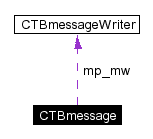
#include "CTBmessage.hxx"
Collaboration diagram for CTBmessage:

Static Public Methods | |
| void | Status (const char *c_text) |
| void | Info (const char *c_text) |
| void | Warning (const char *c_text) |
| CTBint | Error (const char *c_text) |
| void | Hook (CTBmessageWriter *p_mw=0) |
Static Private Attributes | |
| CTBmessageWriter * | mp_mw |
The CTBmessage class provides a set of global functions for handling the output of messages in a unified way for both command line and GUI environments. It provides primitives to render
Hook().
This allows to write classes which can be used in both command line and GUI environments but still have a consistent way of reporting status and exceptional incidences.
CTBmessage provides the API of the message interface in the form of a set of global functions. CTBmessageWriter is an abstract base class from which all the concrete imlementations, like CTBmessageWriterStream, are derived.
Definition at line 18 of file CTBmessage.hxx.
|
|
Show a status message.
Status messages will be written to the status field of the main window of a GUI application. In command line applications they are either discarded or written to Definition at line 59 of file CTBmessage.cxx. |
|
|
Show an informational message.
Informational messages will be written to a scrollable text widget in a separate dialog window in a GUI application and to Definition at line 74 of file CTBmessage.cxx. |
|
|
Show an warning message.
Warning messages will be produce a `warning dialog box' in a GUI application and written to Definition at line 88 of file CTBmessage.cxx. |
|
|
Show an error message.
Error messages will be produce an `error dialog box' in a GUI application and written to Definition at line 102 of file CTBmessage.cxx. |
|
|
Setup the message writer.
CTBmessage::Hook(new CTBmessageWriterQt);
In command line applications the call to Definition at line 124 of file CTBmessage.cxx. Referenced by Error(), Info(), Status(), and Warning().
|
|
|
Definition at line 133 of file CTBmessage.cxx. |
 1.2.9-20010812 written by Dimitri van Heesch,
© 1997-2001
1.2.9-20010812 written by Dimitri van Heesch,
© 1997-2001